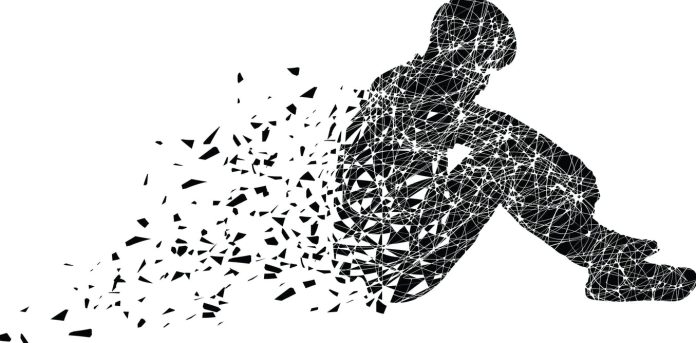
When Sushant Singh Rajput hanged himself, India began to discuss depression more openly. Depression is a common mental disorder with more than 264 million people in the world suffering from it. Today there are effective psychological and pharmacological treatments available for depression, but what is lacking is acceptance of the mental illness. In India, while it is okay to visit a doctor for a physical ailment, even today it is taboo to reach out for help to address a mental disease. Depression can be caused by events in life or chemical changes in the brain leading to suicide. With one person committing suicide every 40 seconds, around 800,000 people (mostly between 15-29 years old) die each year. In 2020, with the current lockdown, job losses, and the insecurities post-pandemic re-opening there will surely be more persons going into depression.

What is Depression?
Depression is considered as a leading cause of disability worldwide because of the total work years lost due to one’s inability to function productively. This mental disorder is diagnosable and distinct from feelings of sadness, stress or fear that we experience from time to time in normal lives. The most common types of depression are:
Major depressive disorder
In this type of disorder, the person feels depressed most of the time for most days of the week. He or she may lose interest or pleasure in any activity, lose or gain weight, feel sluggish, tired, restless, agitated, remorseful and worthless, and have constant thoughts of suicide.
Recurrent depressive disorder
This Recurrent or Persistent depressive disorder comprises of repeated depressive incidents where the individual fees sad, guilty, tired, uninterested and suffers from disturbed sleep, loss of appetite, and reduced concentration. This mostly lasts for a period of two weeks before it diminishes and reoccurs later. It mars an individual’s ability to function successfully at school/workplace or cope with daily life activities. A recurrent depressive incident can vary from mild to severe.
Anxiety disorders or dysthymia
In this type of lingering mild depression the symptoms are similar to depressive disorders, but less extreme and stretch over a longer period of time. The person’s experiences generalised anxiety disorder (GAD), obsessive-compulsive disorder (OCD) and post-traumatic stress disorder (PTSD) panic disorder.
Bipolar affective disorder
Bipolar depression typically consists of depressive and manic anxiety incidents interspersed by periods of absolute normal behaviour.

Who is most likely to get depressed?
The main causes that lead to depression are poverty, unemployment, death of a loved one, heartbreak, chronic illness and substance overuse.
Why depression often goes untreated
- 76% of people in low-income and 85% of people in middle-income countries do not have access to treatment for their mental disorder.
- Hospitals and healthcare may suffer a lack of resources in mental healthcare as well as lack of trained health-care providers
- Often due to the social stigma associated with mental disorders the patient’s family does not seek help and timely treatment.
- Uneducated persons instead of referring the case to a mental health specialist often seeks help from quacks and godmen who have no idea of the disease let alone be able to provide a cure.
- Inaccurate diagnosis and assessment of the condition can only worsen it if the patient is solely prescribed antidepressants.
Preventing depression – what we need to do
There is interrelationship between depression and physical health. Often incurable diseases like cancer lead to depression.
- Join a program offered by an NGO/foundation to reduce depression.
- Address signs of mental illness and depression in school
- Include programs in the school curriculum to enhance positive thinking in children and adolescents.
- Educate parents to intervene and seek the correct course of action to handle behavioral problems right at the start.
- Exercise programs and social interaction for the lonely elderly can also help to avoid depression.
Depression Diagnosis and Screening and Treatment
Psychosocial treatments such as behavioural activation, cognitive behavioural therapy (CBT) and interpersonal psychotherapy (IPT), are effective for mild depression. These individual and/or group face-to-face psychological treatments are delivered by professionals and supervised lay therapists.
While antidepressants medication such as selective serotonin reuptake inhibitors (SSRIs) and tricyclic antidepressants (TCAs) are used for moderate-severe depression, it is a complete no-no to self-medicate without consulting a specialist. When therapy and medication are not working doctors may suggest Electroconvulsive therapy (ECT), Transcranial magnetic stimulation (TMS), or Vagus Nerve Stimulation (VNS).
WHO has introduced programs like Problem Management Plus, which describes the use of behavioural activation, relaxation training, problem-solving treatment and strengthening social support. It also has the Thinking Healthy Program that uses cognitive-behaviour therapy for perinatal depression.

Conclusion
The pandemic is taking its toll on the mental health of people worldwide. The coronavirus has upended or outright eliminated work plunging millions back to poverty. At one end of the spectrum shut down of schools, religious places, malls and restaurants have restricted people’s movement and on the other end, social distancing has aggravated loneliness and depression for many.
As per a recent review by the US Centres for Disease Control and Prevention (CDC), it came to fore that 1 out of 10 aged above 25 years and 1 out of 4 aged 18-24 years from the 5,400 respondents reviewed had earnestly considered suicide during the pandemic lockdown.
We don’t want to lose another Sushant Singh Rajput. It is time to recognize and address mental health with compassion to destroy the Deadly Depression Demon of 2020 before it can consume another innocent life.
